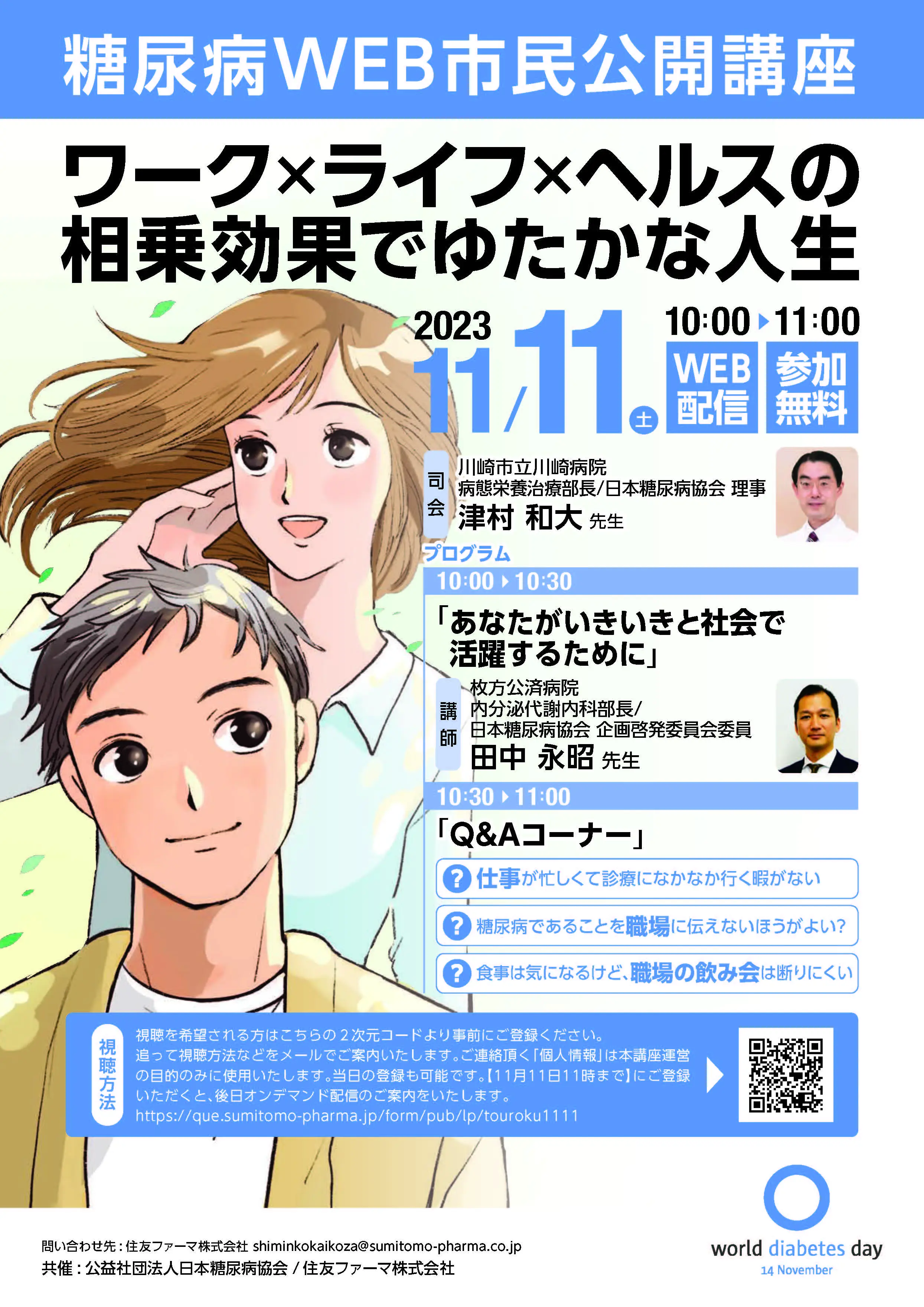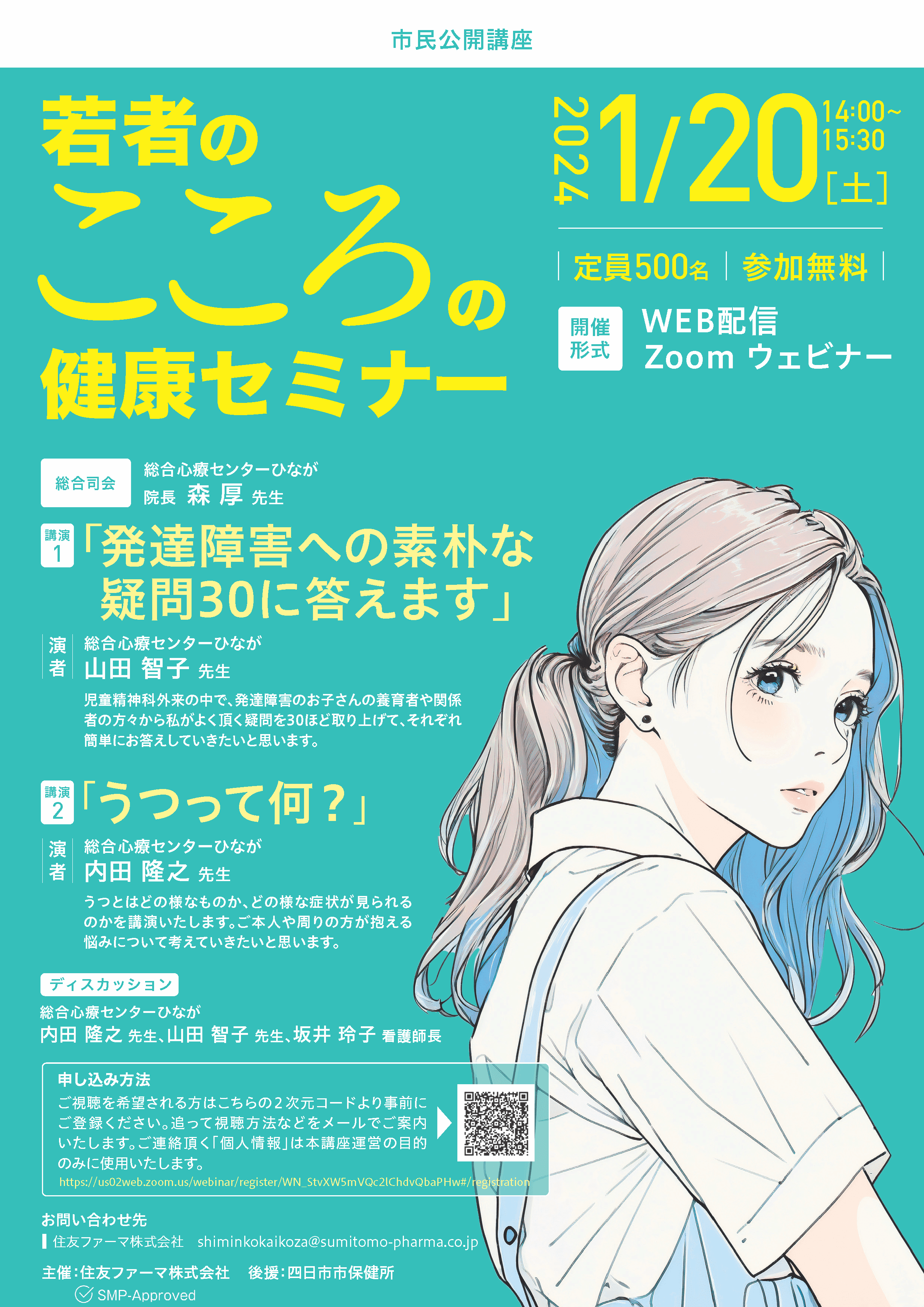Patient Support and Advocacy
Improving Disease-Related Literacy for Patients, Their Families, and Society
Sumitomo Pharma Group has "Patient First" as one of its Values, clearly defining the importance of prioritizing the diverse well-being of patients above all else in its business activities. In addition to developing innovative products and healthcare solutions to deliver new value, we actively engage in providing high-quality information to meet patient needs, raising disease awareness, and advocacy activities. Through these efforts, we strive to further improve disease literacy across society and contribute to the betterment of healthcare and fuller lives of patients.
Public Lectures

Sumitomo Pharma holds public lectures nationwide not only for patients and their families but also for the
wider general public with the objective of promoting the correct understanding of diseases and
contributing to the solving of social issues.
As part of our Material Issues, we aim to address the "Improving Access to Medicines and Advocacy" by
raising disease awareness from the patient's perspective, thereby contributing to the elimination of
disease stigma, prejudice arising from lack of proper understanding, and the promotion of early treatment.
Our key performance indicator (KPI) is "Further Improving Disease-Related Literacy for the General Public,
Including Patients," and we have set a target of 10,000 cumulative attendees at our public lectures from
fiscal 2023 to fiscal 2027.
In fiscal 2023, we organized 14 public lectures on Parkinson's disease (PD) and dementia with Lewy bodies
(DLB), 4 on diabetes and 11 on mental illness. The lectures were held mainly online or in a hybrid format, and
some of the lectures were also made available as archived recordings.
The common theme of the lectures on PD and DLB was "Looking to the future, contribute to a fulfilling
lifestyle for patients and their caregivers," while that for the lectures on diabetes was "Importance of
continuing treatment for diabetes."
In the field of mental illness, one of the important points is to "create an environment where early
detection, consultation, and treatment are not hesitated." Therefore, we have conducted lectures in
collaboration with not only medical institutions but also local governments, public health centers, and
educational institutions.



(These lectures have already been completed.)
The total number of attendees for the lectures was around 5,200 and more than 90% of respondents evaluated the content of lectures positively.In fiscal 2024, focusing on social issues concerning patients, their families and caregivers, Sumitomo Pharma will make efforts to enhance the content of our activities to further contribute to raising disease literacy among the public.
Results of Questionnaire on Public Lectures Held in Fiscal 2023
Did the content meet your needs?
Did you understand the content?
Were you satisfied with the content?
- *The same questionnaire was given for all lectures, calculating totals for responses. Multiple responses were not allowed.
Comment from the Person in Charge

There are various social issues surrounding patients, their families and
caregivers.
One of them is stigma against diseases. For instance, psychiatric diseases are commonly
developed among the younger generation but, due to fearing stigma, some people may hesitate to see a
doctor. It is important to create an environment in which there is no hesitation toward early discovery,
early consultation and examination by reducing the stigma against psychiatric diseases through the correct
understanding of them by the patients themselves, their families and society overall. There is also a
stigma against diabetes, where in the present situation, patients can lose the chance for proper treatment
by hiding their diabetes from the people around them.
As a pharmaceutical company, we consider that
in addition to providing pharmaceuticals, we also have to play a role in solving social issues. By
promoting a correct understanding of diseases, Sumitomo Pharma aims to help create a society in which
patients can lead their lives with peace of mind.
Misaki Ono
Sustainability Group, Corporate
Communications
(The divisions that the person featured in this article belonged to and the names of
those divisions are current as of the time of the interview.)
Providing Disease Information for Patients and General Public on Health Information Websites
Explaining Schizophrenia and Bipolar Disorder in Simple Terms

Kokoro Share (https://kokoro-share.jp, available in Japanese only) aims to eliminate the stigma surrounding mental illnesses and contribute to the recovery, social participation and employment of individuals with schizophrenia, as well as to promote the early and appropriate diagnosis and treatment of bipolar disorder. Through this website, we strive to provide accurate information in an easy-to-understand manner, contributing to better lives for patients and their families. In June 2023, we added "Interview-style video on pointers for continuing employment" on our schizophrenia-related website. In the video, a patient, an employer and a supporter give pointers for finding a job as well as continuing employment. To deepen societal understanding of mental illnesses, eliminate prejudice, and deliver accurate knowledge to a wider audience, we will continuously update the site to provide even more useful information.
Rehabilitation for Parkinson’s Disease through Cooking

The concept of Rehabili Kitchen for Parkinson's Disease Patients (https://www.sumitomo-pharma.co.jp/public/parkinson/kitchen/, available
in Japanese only) is rehabilitation during cooking to increase awareness of each individual
movement.
We introduce cooking-themed rehabilitation that can be done at home with
videos.
Finding out what movements they are capable of, our hope is that patients will spend their
days in a healthful way while sharing the enjoyment of cooking with family members or caregivers.
Daily Self-Care Matched to Lifestyle of Those with Type 2 Diabetes

"Diabetes My Care Notebook (https://www.sumitomo-pharma.co.jp/public/diabetes/, available in Japanese only)" provides information on daily self-care through diet and exercise for those diagnosed with type 2 diabetes, which they can start straightaway. It includes both things that are simple to do and things that require a bit of preparation, so we hope that people will adopt dietary and exercise therapies that are easy to continue in their daily lives.
Supporting People with Psychiatric Diseases in Finding Employment and Social Reintegration
Support through Special-Purpose Subsidiary "Cocowork"
Low employment retention rates among people with psychiatric diseases is a social
issue. In addition to focusing on drug discovery for psychiatric diseases, Sumitomo Pharma engages in
initiatives to support people with psychiatric diseases that are difficult to resolve with medication alone in
taking up employment and social reintegration. Among them is the establishment of our special-purpose
subsidiary Cocowork Co., Ltd. (https://www.cocoworkjoy.com/, available in Japanese only).
At Cocowork, employees
with
psychiatric diseases grow leafy vegetables such as frilled lettuce, arugula and Swiss chard hydroponically,
which are sold to supermarkets and restaurants. It also provides vegetables to children’s cafeterias as
the donation from Sumitomo pharma. In addition, a collaboration with Hiro Coffee, a popular coffee shop in
Osaka and Hyogo Prefecture, has been started.
Going forward, Sumitomo Pharma will continue to support the
employment of people with psychiatric diseases through the initiatives of its special-purpose subsidiary
Cocowork Co., Ltd.


Harvesting at Cocowork

Collaboration with Patient Groups and Promotion of Support Activities through Donations
Support for Patient Groups in Japan
Sumitomo Pharma Group conducts the business activities driven by its Mission, "To broadly contribute to society through value creation based on innovative research and development activities for the betterment of healthcare and fuller lives of people worldwide." Under our Mission, we engage in patient support activities with the aim of "Allowing all patients and their families to lead healthy, fulfilled lives."
Main Donations in Fiscal 2023
- The National Federation of Associations of Families with The Mental Illness in Japan
- Japan Patients Association
- The Support Network for NANBYO Children of Japan
- Japan Parkinson's Disease Association
- Dementia People and Family Association
- Children's Cancer Association of Japan
- Japan Epilepsy Association
- Japan Narcolepsy Association
- Japan Amyotrophic Lateral Sclerosis Association
For more information on patient support activities in Japan and other countries, please see "Activity Reports."
Transparency in Collaboration with Patient Groups
To maximize the value we provide for the betterment of healthcare and fuller lives of people, we believe that
it is crucial to listen to the voices of patients, patient organizations, their families, and supporters, and
to incorporate those voices into our activities, including pharmaceutical research, development, production,
quality control, sales, reliability assurance, and medical science.
With representatives of patient groups sitting on an increasing number of government committees and
investigative commissions as governments and the medical community put greater emphasis on the "voice of the
patient," patient groups have become important stakeholders in the mission to improve medical care.
In light of this, we consider that it is crucial for the broader society to be aware of and have an
understanding of the fact that all collaborations with patient groups take place in accordance with high
ethical standards and mutual understanding.
The Japan Pharmaceutical Manufacturers Association (JPMA) issued its "Transparency Guideline for the
Relationship between Corporate Activities and Patient Organizations" and "Collaborations Guideline for
Pharmaceutical Industry and Patient Organizations." As a member of JPMA, we have responded to this by adopting
our own "Guidelines Concerning Transparency in Collaborations with Patient Groups" and "Guidelines Concerning
Collaborations with Patient Groups." We actively and continuously collaborate with patient groups and disclose
information concerning funding and other support we provide to patient groups and patient advocacy groups
through our website, in accordance with these guidelines.